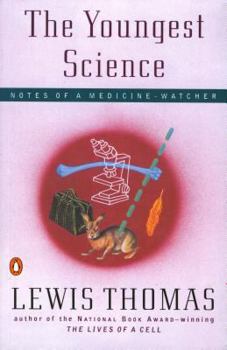The Youngest Science: 2notes of a Medicine-Watcher
Select Format
Select Condition 
Book Overview
From the 1920s when he watched his father, a general practitioner who made housecalls and wrote his prescriptions in Latin, to his days in medical school and beyond, Lewis Thomas saw medicine evolve... This description may be from another edition of this product.
Format:Hardcover
Language:English
ISBN:067079533X
ISBN13:9780670795338
Release Date:February 1983
Publisher:Viking Books
Length:270 Pages
Weight:1.10 lbs.
Related Subjects
Biographical Biographies Biographies & History Biography & History Clinical Health, Fitness & Dieting Health, Fitness & Dieting History & Philosophy Medicine Modern (16th-21st Centuries) Physician & Patient Reference Science Science & Math Science & Scientists Science & Technology TextbooksCustomer Reviews
5 ratings
A very good book
Published by Thriftbooks.com User , 15 years ago
This book is Lewis Thomas' biography and his life is an interesting tale in its own right, but it also includes a great history of modern medicine. A really worthwhile read.
A wonderful collection of medical memories...
Published by Thriftbooks.com User , 18 years ago
I picked up this book because of my enjoyment of Thomas' earlier books, Lives of a Cell, and Medusa and the Snail. This happened about 20 years ago. I've read The Youngest Science: Notes of a Medicine-Watcher two times since then. The Youngest Science focuses not on specific "adventures" within medicine, microbiology, and evolution, but more on the evolution of Dr. Thomas himself, from watching his father (a physician), to going through medical school, to becoming a medical researcher, to reaching the positions of authority within various colleges of medicine. Thomas was in the early part of his career when there came about profound changes in the understanding and treatment of disease processes. This makes his observations particularly interesting. The book suffers from being so far behind the times in terms of modern medicine. Nevertheless, as the historical documentation of the evolution of a medical career, it remains fascinating.
The evolution of medicine from art to science
Published by Thriftbooks.com User , 20 years ago
Although he refers to himself as a watcher, Lewis Thomas was very much a participant in the major event where medicine went from being personal and in some ways useless to a science where cures were routine. He starts the book with a description of the role of a physician before the Second World War. His father was a physician who had an office in their home, although most of his work was making house calls and hospital rounds. In those days, before sulfa, penicillin and other drugs, there were few diseases that could be treated. Therefore, medicine was largely conducted by conversation and touch, and many prescribed medications were placebos. Thomas talks openly about how ineffectual doctors were in actually curing people, and while he notes that he has no desire to regress to those times, he does say that some aspects of medicine have been lost. Not long after he began practicing medicine, science and technology began delivering cures to many of the ailments of humans. Thomas adapted very well to the new realities, eventually rising to the presidency of the Memorial Sloan-Kettering Cancer Center in New York. He is quite right in calling medicine the youngest science, as it has indeed only become a science in the middle of the twentieth century. There is no question that Thomas was a talented scientist and physician, but he was also an outstanding writer. These essays, always tainted with a sense of wonder, ignorance and optimism, are an inside look at some of the aspects of how medicine was and is practiced. They are a joy to read, his insights into how medicine has changed shed a great deal of light on why there is a crisis in health care.
Autobiography of a lifetime in medicine
Published by Thriftbooks.com User , 26 years ago
This is an enjoyable book of a lifetime spent in the field of medicine. My favorite chapters were the early ones as Thomas looked back at what medicine was like early in this century, including what he remembers from his father's medical practice. This medical reminiscence differs from most other physician's writings in that Thomas has spent the majority of his career in research rather than in the clinical practice of medicine. But if research is often thought of as dull drudgery, Thomas certainly does not reflect that in the book. His genuine enthusiasm (and important finds along the way) have shown how necessary research is to progress in health care. As a clinical physician myself, I gained a new appreciation for this side of medicine. Lewis's enthusiasm is infectious, his comments candid, and his medical poetry quite entertaining. I enjoyed reading this.
Words of Wisdom from a Good Man
Published by Thriftbooks.com User , 26 years ago
My favorite Lewis Thomas, so far. There are many good science popularizers around, the late Carl Sagan being better known because of his TV series - Cosmos. Dr. Thomas' books stand-out as being comfy because of his "fireside chat" way of explaining and telling stories. Why do I call him a "good man"? Because his love shines through in his writing.





